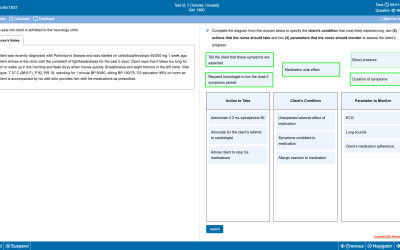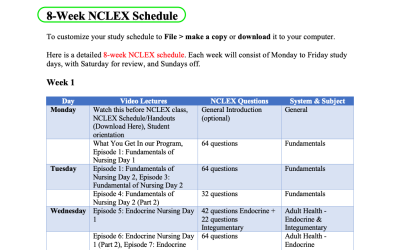Tips for Answering Bow-Tie Questions on the NCLEX
Preparing for the NCLEX can be a daunting task, and one of the question types you might encounter is the bow-tie question. These questions are designed to assess your clinical judgment and decision-making skills. To help you excel in this area, we’ve compiled some essential tips for answering bow-tie questions effectively.
1. Understand the Bow-Tie Question Structure
Bow-tie questions consist of three main parts:
- A central issue or scenario that presents a patient situation.
- Five answer options where you need to identify:
- Two actions you would take to address the issue.
- Two potential outcomes or interventions.
- One critical point or significant issue related to the scenario.
This structure tests your ability to prioritize and make clinical decisions.
2. Read the Scenario Carefully
Take your time to thoroughly read the scenario presented in the bow-tie question. Pay attention to the patient’s condition, symptoms, and any other relevant details. Understanding the scenario is crucial for selecting the most appropriate actions and outcomes.
3. Prioritize Patient Safety
When choosing actions and outcomes, always prioritize patient safety. Consider interventions that address life-threatening conditions first. For example, if a patient is experiencing difficulty breathing, your immediate action should be to ensure their airway is clear and they are receiving adequate oxygen.
4. Use Clinical Judgment
Apply your clinical knowledge and judgment to determine the best course of action. Think about the nursing process (assessment, diagnosis, planning, implementation, and evaluation) and how it applies to the scenario. Your goal is to provide the best possible care based on the information provided.
5. Focus on the Most Relevant Information
In bow-tie questions, not all information presented in the scenario will be relevant to the answer. Identify key pieces of information that directly impact the patient’s condition and required interventions. This will help you narrow down your choices and make more accurate decisions.

6. Practice Critical Thinking
Bow-tie questions often require you to think critically and consider multiple factors simultaneously. Practice critical thinking by analyzing different patient scenarios and determining the best course of action. This will help you become more comfortable with the decision-making process required for these questions.
7. Time Management
While it’s important to thoroughly analyze the scenario, be mindful of the time you spend on each question. Bow-tie questions can be time-consuming, so practice managing your time effectively to ensure you can complete the entire exam within the allotted time.
8. Review and Reflect
After answering a bow-tie question, review your choices and reflect on your decision-making process. If possible, discuss your reasoning with a study partner or mentor to gain additional insights. Reflecting on your approach will help you improve your critical thinking skills and prepare for similar questions in the future.
9. Utilize Practice Resources
Take advantage of practice resources such as NCLEX review books, online question banks, and study plans. CrushNCLEX Reviews offer comprehensive practice questions and detailed explanations to help you understand the rationale behind each answer. Practicing with these resources will build your confidence and enhance your test-taking skills.
10. Stay Calm and Focused
During the exam, it’s natural to feel nervous, but try to stay calm and focused. Take deep breaths, read each question carefully, and trust in your preparation. Staying composed will help you think more clearly and make better decisions.
Conclusion
Bow-tie questions on the NCLEX are designed to test your clinical judgment and decision-making skills. By understanding the structure of these questions, prioritizing patient safety, using clinical judgment, and practicing critical thinking, you can excel in answering bow-tie questions. Utilize CrushNCLEX reviews and stay calm during the exam to ensure your success.




